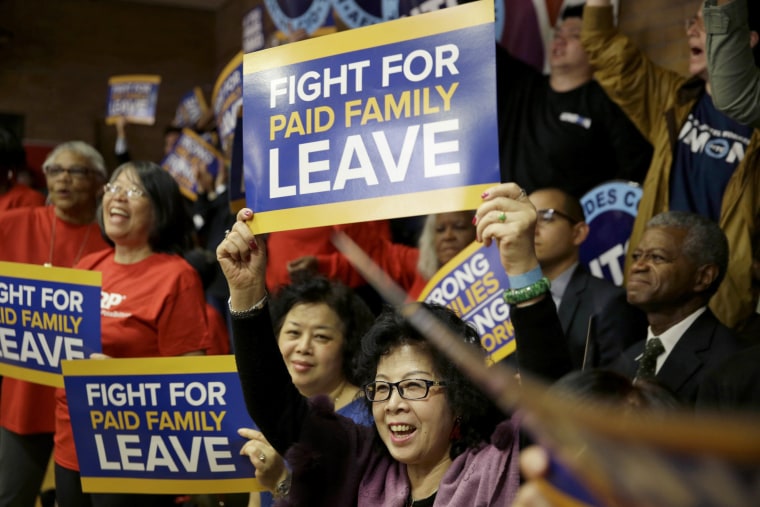As another paid leave proposal has been put forward this month, this time by Sen. Kamala Harris, it’s clear a paid leave program is top of mind for America’s voters. It’s also top of mind for small businesses. Enacting legislation that would establish a social insurance program to allow people to take paid time away from work to address their own serious medical issue, welcome a new child or care for a seriously ill or injured loved one, would support the 30.2 million small businesses that employ nearly half of our nation’s workers.
Since the Family And Medical Insurance Leave (FAMILY) Act was first introduced by Rep. Rosa DeLauro (D-Conn.) and Sen. Kirsten Gillibrand (D-N.Y.) nearly six years ago, paid leave has morphed from a niche, mostly partisan issue to a mainstream policy priority, with support from voters and presidential candidates across the political spectrum. In just six years, six additional states and the District of Columbia have enacted statewide paid family and medical leave programs.
This is all very exciting, but while we have achieved tremendous state progress and near-unanimous acknowledgement that America’s workers and small business owners need paid time away from work to care for their families, we still lack consensus on what a national plan would look like – mainly who it will cover and how we will pay for it.
For answers, lawmakers should look to state programs that are already in effect and working well. They should also consider the experiences and views of small business owners in these states and elsewhere.
As Tony Sandkamp, a small employer and Main Street Alliance member from New Jersey told the Ways & Means Committee during a paid leave hearing in May, “from a small business perspective, well-structured, comprehensive paid leave programs like New Jersey’s make leave more affordable and simpler. They spread the cost of leave, reducing the burden on individual employers without creating significant new administrative requirements.”
Sandkamp is not alone in this view. In fact, seven in 10 small business owners would support a national paid family and medical leave policy. The National Partnership for Women & Families’ comprehensive study of the three longest-running state paid leave programs found little evidence that state paid leave programs are particularly burdensome for employers or that employers oppose these programs. Conversely, many employers reported that programs help improve retention, productivity and morale.
Small employers also overwhelmingly support a paid leave policy solution that relies on small payroll contributions from both employers and employees – and small employers have been important advocates in fighting for similar state policies and ensuring those programs are effective.
RELATED: Katy Tur after maternity leave: Lack of federal paid leave is 'shameful'
A small business voice is important in analyzing these policies because opponents of a national social insurance plan for comprehensive paid leave typically claim that it would harm employers – particularly small businesses.
This conversation, however, needs to be informed by the actual experiences and opinions of the employers themselves. The reality is that paid leave programs enable small employers to offer this critical benefit without having to shoulder the entire cost. Small employers understand that paid leave will help them to attract and retain talent and compete with large corporations that can afford to offer paid leave without a public policy.
The debate around paid leave continues – in Congress, on the campaign trail and around kitchen tables across America – small business owners need to continue to be engaged in the legislative process, just as they have been for the nine state policies on which the FAMILY Act is modeled.
Amanda Ballantyne is Executive Director for the Main Street Alliance, which provides a national network of over 30,000 small businesses a voice on the most pressing public policy issues across the nation. Debra L. Ness is president of the National Partnership for Women & Families, an organization that works to improve the lives of women and families by achieving equality for all women.
